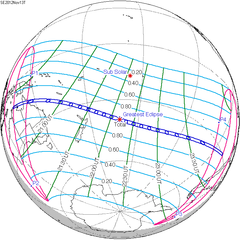November 2003 lunar eclipse
| Total eclipse | |||||||||||||||||
 Totality from Minneapolis, 1:16 UTC | |||||||||||||||||
| Date | 9 November 2003 | ||||||||||||||||
|---|---|---|---|---|---|---|---|---|---|---|---|---|---|---|---|---|---|
| Gamma | −0.43193 | ||||||||||||||||
| Magnitude | 1.01785 | ||||||||||||||||
| Saros cycle | 126 (44 of 70) | ||||||||||||||||
| Totality | 21 minutes, 58 seconds | ||||||||||||||||
| Partiality | 211 minutes, 26 seconds | ||||||||||||||||
| Penumbral | 363 minutes, 16 seconds | ||||||||||||||||
| |||||||||||||||||
A total lunar eclipse took place on November 9, 2003, the second of two total lunar eclipses in 2003, the first being on May 16, 2003. It is the first total lunar eclipse of 21st century which happened in a micromoon day.
This was the last of 14 total lunar eclipses of Lunar Saros 126, which started on 19 June 1769 and ended on 9 November 2003.
Visibility
Photo gallery
-
Grand Rapids, MI, 0:58 UT
-
Minneapolis, MN, 1:00 UT
-
Oudenaarde, Belgium, 1:08 UT
-
Minneapolis, MN, 1:24 UT
-
Grand Rapids, MI, 2:28 UT
Relation to other lunar eclipses
Eclipses of 2003
- A total lunar eclipse on May 16.
- An annular solar eclipse (one limit) on May 31.
- A total lunar eclipse on November 9.
- A total solar eclipse on November 23.
Lunar year series
It is the second of four lunar year cycles, repeating every 354 days.
| Lunar eclipse series sets from 2002–2005 | ||||||||
|---|---|---|---|---|---|---|---|---|
| Descending node | Ascending node | |||||||
| Saros Photo |
Date View |
Type Chart |
Gamma | Saros Photo |
Date View |
Type Chart |
Gamma | |
| 111 | 2002 May 26
|
penumbral
|
1.1759 | 116 | 2002 Nov 20
|
penumbral
|
−1.1127 | |
121
|
2003 May 16
|
total
|
0.4123 | 126
|
2003 Nov 09
|
total
|
−0.4319 | |
131
|
2004 May 04
|
total
|
−0.3132 | 136
|
2004 Oct 28
|
total
|
0.2846 | |
| 141 | 2005 Apr 24
|
penumbral
|
−1.0885 | 146
|
2005 Oct 17
|
partial
|
0.9796 | |
| Last set | 2002 Jun 24 | Last set | 2001 Dec 30 | |||||
| Next set | 2006 Mar 14 | Next set | 2006 Sep 07 | |||||
Saros series
Lunar Saros series 126, repeating every 18 years and 11 days, has a total of 70 lunar eclipse events including 14 total lunar eclipses. Solar Saros 133 interleaves with this lunar saros with an event occurring every 9 years 5 days alternating between each saros series.
First Penumbral Lunar Eclipse: 1228 Jul 18
First Partial Lunar Eclipse: 1625 Mar 24
First Total Lunar Eclipse: 1769 Jun 19
First Central Lunar Eclipse: 1805 Jul 11
Greatest Eclipse of the Lunar Saros 126: 1859 Aug 13, lasting 106 minutes.
Last Central Lunar Eclipse: 1931 Sep 26
Last Total Lunar Eclipse: 2003 Nov 09
Last Partial Lunar Eclipse: 2346 Jun 05
Last Penumbral Lunar Eclipse: 2472 Aug 19
1901-2100
Metonic series
This eclipse is the second of four Metonic cycle lunar eclipses on the same date, November 8–9, each separated by 19 years:
The Metonic cycle repeats nearly exactly every 19 years and represents a Saros cycle plus one lunar year. Because it occurs on the same calendar date, the Earth's shadow will be in nearly the same location relative to the background stars.
|
|

|

|
Half-Saros cycle
A lunar eclipse will be preceded and followed by solar eclipses by 9 years and 5.5 days (a half saros).[1] This lunar eclipse is related to two total solar eclipses of Solar Saros 133.
| November 3, 1994 | November 13, 2012 |
|---|---|

|

|
See also
- List of lunar eclipses and List of 21st-century lunar eclipses
- Solar eclipse of November 23, 2003
- May 2003 lunar eclipse
- May 2004 lunar eclipse
- October 2004 lunar eclipse
References
- ^ Mathematical Astronomy Morsels, Jean Meeus, p.110, Chapter 18, The half-saros
External links
- Saros cycle 126
- 2003 Nov 09 chart: Eclipse Predictions by Fred Espenak, NASA/GSFC
- NASA Saros series 126
- Photos: Lunar Eclipse 8 November 2003
- Spaceweather.com: Lunar eclipse gallery Nov 8, 2003









